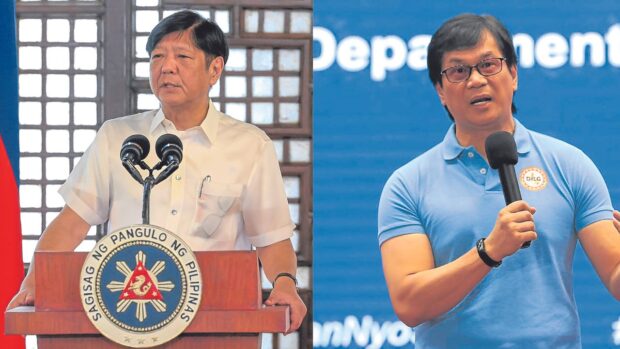Marcos unfazed by call for secession–Abalos
President Ferdinand Marcos Jr. was unbothered by former President Rodrigo Duterte’s call for an independent Mindanao, according to Interior Secretary Benhur Abalos, who met with him in Malacañang on Tuesday for a Philippine National Police briefing on the country’s peace and order situation.
“No, we did not talk about the ‘One Mindanao,’ about secession. We did not talk about it,” Abalos told reporters in a briefing afterward.
Asked if Mr. Marcos issued orders on how to handle Duterte’s push for a separate and independent Mindanao, Abalos said the President appeared unperturbed by the matter.
“No, no instructions. He chose to ignore it, let’s put it that way,” he added.
Duterte, in a press briefing last week, said that local political forces would be regrouping to push for Mindanao to secede from the Philippines—a call rejected by the Armed Forces, PNP and other government officials over the weekend.
Article continues after this advertisementAbalos clarified that Mr. Marcos “definitely did not give any order” for government officials to oppose Duterte’s move.
Article continues after this advertisement“Those who issued statements did so out of concern for what’s happening,” he said.
According to Abalos, the Department of the Interior and Local Government has not monitored any effort to actively push for a separate Mindanao.
“With all Filipinos who grew up with a Luzon, Visayas and Mindanao, I don’t think anyone will be swayed by it. We all have love for this country,” he said.
READ: Año: Any secession move to be met with force
He and PNP chief Gen. Benjamin Acorda Jr. also declined to comment on Duterte’s possible liability in pushing for secession, which was contrary to the Constitution.
“As mentioned, it’s up to the [Department of Justice] to study these things and from there we can [determine] our possible actions,” Acorda said in the same press briefing.
At the House of Representatives, Lanao del Sur Rep. and Assistant Majority Leader Zia Adiong urged personalities seeking the secession of Mindanao to reconsider and prioritize the common good.
Adverse economic effects
“Secession would not only unravel the social fabric that binds us but would [also] have devastating economic [effects] on Mindanao,” he said.
“There are millions worth of ongoing projects that cannot be sustained by the local economy. This is not even mentioning the millions that would be necessary to reestablish government services from such a severance,” Adiong noted.
He also expressed concern about “leaving the hard-won fruits of the peace process rotting on the vine,” adding that history has shown that secession “often leads to conflict and bloodshed.”
“The scars of division run deep, and the cost of such a move would be felt by generations to come,” Adiong said.
The opposition also criticized Duterte, branding his call for secession a “selfish move” to avoid accountability for his crimes.
“Duterte’s history reveals a concerning pattern of exploiting divisive tactics for personal gain. His abrupt withdrawal from the [International Criminal Court] investigation into the drug war demonstrates this strategy. Now, faced with potential legal repercussions, he resurrects the secession issue, a highly sensitive and complex topic, to manipulate public discourse and divert attention,” Liberal Party spokesperson and former Sen. Leila de Lima said.
She added that the implications of Mindanao’s separation would be profound not only for its residents but for the country as well. She stressed that peace, stability and more opportunities were what people in the south needed, not the distractions of those intoxicated by power. —WITH REPORTS FROM MARLON RAMOS, NESTOR CORRALES AND RUSSEL LORETO INQ
